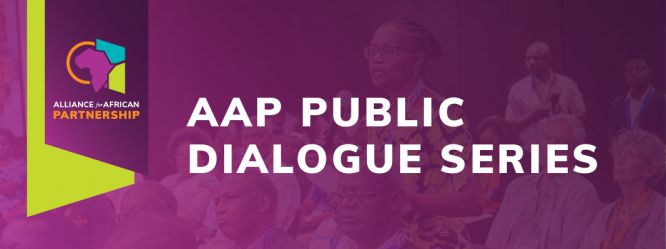
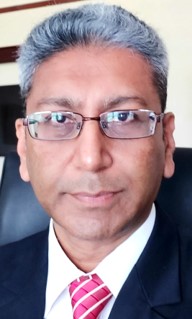 Professor Dhanjay Jhurry was appointed Vice-Chancellor of the University of Mauritius (UoM) in March 2017. He is championing the vision of a research-engaged and entrepreneurial university working in close partnership with the public and private sectors as well as with the community to foster innovation. He is putting a lot of emphasis on organizing research at the University around the SDGs and is leading various initiatives to develop human, intellectual, business and social capital through an inclusive and openness approach. Under his leadership the University of Mauritius has championed the concept of international education diplomacy and built strong partnerships with Universities worldwide.
Professor Dhanjay Jhurry was appointed Vice-Chancellor of the University of Mauritius (UoM) in March 2017. He is championing the vision of a research-engaged and entrepreneurial university working in close partnership with the public and private sectors as well as with the community to foster innovation. He is putting a lot of emphasis on organizing research at the University around the SDGs and is leading various initiatives to develop human, intellectual, business and social capital through an inclusive and openness approach. Under his leadership the University of Mauritius has championed the concept of international education diplomacy and built strong partnerships with Universities worldwide.
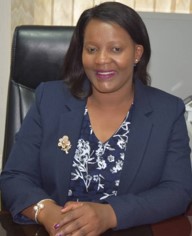 Dr. Ambumulire Phiri received her PhD in Education from the University of Missouri-St. Louis, an MA in Teaching Studies from Belhaven University in Jackson Mississippi, a Graduate Certificate in Autism and Developmental Disabilities from the University of Missouri-St. Louis, and a BA with an emphasis in Christian Education from the African Bible College in Malawi.
Dr. Ambumulire Phiri received her PhD in Education from the University of Missouri-St. Louis, an MA in Teaching Studies from Belhaven University in Jackson Mississippi, a Graduate Certificate in Autism and Developmental Disabilities from the University of Missouri-St. Louis, and a BA with an emphasis in Christian Education from the African Bible College in Malawi.
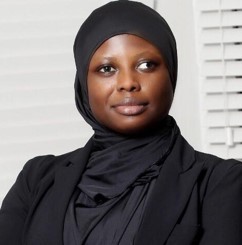 Rahmat Eyinfunjowo's work focuses on business development and capacity building for SMEs in Africa's agriculture and food landscapes. She is passionate about hunger alleviation, SME growth, youth in agriculture, sustainability, innovation start-ups, and community development. Based in Lagos, Nigeria, Rahmat has spent the last half-decade implementing key agriculture projects in the country, providing operational support for a tech start-up in Northern Nigeria, supporting farmers on a cocoa sustainability project across Southwest Nigeria, and developing and implementing a business plan for a pioneer early generation seed enterprise in Ibadan, Nigeria.
Rahmat Eyinfunjowo's work focuses on business development and capacity building for SMEs in Africa's agriculture and food landscapes. She is passionate about hunger alleviation, SME growth, youth in agriculture, sustainability, innovation start-ups, and community development. Based in Lagos, Nigeria, Rahmat has spent the last half-decade implementing key agriculture projects in the country, providing operational support for a tech start-up in Northern Nigeria, supporting farmers on a cocoa sustainability project across Southwest Nigeria, and developing and implementing a business plan for a pioneer early generation seed enterprise in Ibadan, Nigeria.
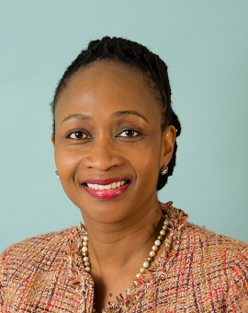 Dr. Pinkie Mekgwe is International IDEA’s Senior Regional Adviser for Africa and West Asia and her work focuses on strengthening programmatic and administrative coherence and performance. Before joining International IDEA in 2018, Mekgwe was Executive Director of Internationalism at the University of Johannesburg in South Africa. She also previously served as Deputy Director at the Office of International Education and Partnerships of the University of Botswana and as Programme Officer for the Council for the Development of Social Science Research in Africa (CODESRIA).
Dr. Pinkie Mekgwe is International IDEA’s Senior Regional Adviser for Africa and West Asia and her work focuses on strengthening programmatic and administrative coherence and performance. Before joining International IDEA in 2018, Mekgwe was Executive Director of Internationalism at the University of Johannesburg in South Africa. She also previously served as Deputy Director at the Office of International Education and Partnerships of the University of Botswana and as Programme Officer for the Council for the Development of Social Science Research in Africa (CODESRIA).
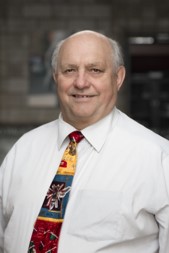 Dr. Nico Jooste is currently the Senior Director of African Centre for Higher Education Internationalisation (AfriC), Port Elizabeth, South Africa. He is involved in the re-thinking of Internationalisation of Higher Education Globally and arranged the Global Dialogue on the future of Higher Education Internationalisation in January 2014 in Port Elizabeth, South Africa and assisted with the drafting of the Nelson Mandela Bay Declaration. He is a past President of the International Education Association of South Africa.
Dr. Nico Jooste is currently the Senior Director of African Centre for Higher Education Internationalisation (AfriC), Port Elizabeth, South Africa. He is involved in the re-thinking of Internationalisation of Higher Education Globally and arranged the Global Dialogue on the future of Higher Education Internationalisation in January 2014 in Port Elizabeth, South Africa and assisted with the drafting of the Nelson Mandela Bay Declaration. He is a past President of the International Education Association of South Africa.
Increasingly universities around the globe have recognized that they must actively engage beyond their campuses and across sectors to upend the traditional perception that they are “ivory towers” that only focus on theory and leave application to disconnected others outside their proverbial walls; or that they engage in research purely for academic purposes and communicate it amongst themselves via journal publications and conferences, with very little engagement with the people outside academia. The universities are now seeing themselves as catalysts for positive change in their communities and beyond. The emergence of the Times Higher Education Impact performance ranking, which assesses universities’ contributions toward achieving the UN Sustainable Development Goals, is evidence of this trend.
To ensure that their work in teaching, learning, and research translates into solutions for global challenges like climate change, poverty reduction, and the global COVID-19 pandemic, higher education institutions are finding creative ways to build bridges to policy makers, the private sector, and local communities. African universities have begun to draft plans, policies, and structures to increase their engagement with external stakeholders who can benefit from the research conducted at the institution and who can inform educational and research programs. This session will examine innovative strategies for African universities to engage across all sectors and the impact these engagements are having the transformation of the African higher education sector.